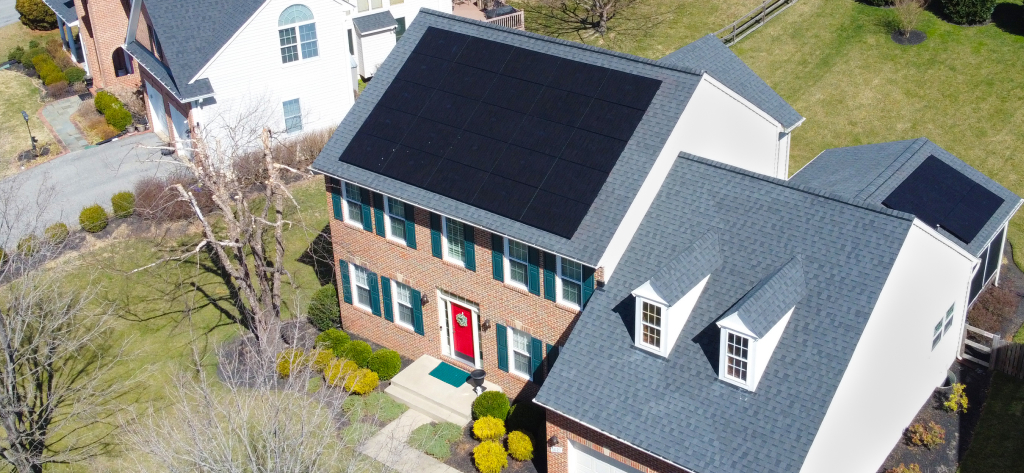Article
How Net Metering Works in Delaware

Delaware’s ambitious Renewable Energy Portfolio aims to generate 40% of the state’s energy using renewable resources by 2035. Residents and business owners utilizing solar panels, wind turbines, and other alternative power sources can participate in net metering programs throughout Delaware to reduce energy costs and help the state achieve these goals.
So, how much can you save with net metering in Delaware, and what are the eligibility requirements? We’re glad you asked!
Today, we’re discussing how these programs can help you slash your monthly utility bills and contribute to the state’s sustainability goals.
What is Net Metering?
Net metering programs are billing arrangements between electricity providers and utility customers who generate renewable energy using solar panels, hydroelectric systems, and other green technologies.
When you install solar panels on your property, your utility company will interconnect your system to the grid and reimburse you for the excess energy you supply to other users. Since the energy you send back to the grid is dispersed among other utility customers, you contribute to a more sustainable power grid by offsetting the consumption of non-renewable electricity.
Net Metering Regulations in Delaware
While many states limit the production capacity of residential solar panel systems to each customer’s average annual energy consumption, Delaware encourages net metering participants to generate excess electricity by setting the bar at 110% and up to 25 kW. These generous eligibility requirements allow customer-generators to install solar panel arrays that exceed their needs in order to return a greater amount of green energy to the grid.
Monthly credits roll over until the end of the annual billing cycle on March 31 of each year, when banked credits expire.
Agricultural facilities may operate systems up to 100 kW, and commercial entities can install solar panel arrays between 500 kW and 2 MW. The Delaware legislature has approved community solar programs, but the available options are currently limited.
How Net Metering Works in Delaware
When you install solar photovoltaic (PV) panels on your roof or in your yard, the materials within those modules absorb ultraviolet radiation and convert it into usable energy that can power the electronics and appliances in your home.
Net metering allows you to connect your PV system to your utility company’s electrical grid and send unused solar energy to the grid for other customers to use. Using a bidirectional meter, the company will compare the power you draw from the grid and the energy you return to the system for other customers. Each month that you create more electricity than you use, credits are added to your account for each kilowatt-hour (kWh), which you can use to offset future utility bills.

How to Switch to Solar in 5 Simple Steps
Benefits of Net Metering in Delaware
The benefits of net metering in Delaware extend beyond individual homeowners who install eligible solar panel arrays. Here are some of the advantages for participants and others in the community:
Financial Savings
Businesses and homeowners in Delaware can enjoy lower utility bills by using solar power to participate in net metering programs. In fact, customer-generators who return substantial energy to the grid may reduce their monthly costs by 50% to 100%.
Commercial entities and prolific private producers can sell solar renewable energy certificates (SRECs), which verify the production of green energy. Each SREC equals one megawatt-hour of renewable energy produced by your system. Many industrial businesses and corporations buy these certificates to reduce their carbon footprints and meet applicable sustainability standards.
Tax Incentives and Rebates
The average cost of a solar panel installation in Delaware can range from $12,500 to $17,000, but with numerous financial incentives — and various net metering programs — these systems generally pay for themselves within 6 to 10 years.
For many solar owners in Delaware, participating in net metering programs is a no-brainer. Regardless of your decision to interconnect with your utility company’s electrical grid, merely installing a solar panel array can have financial advantages. For example, the federal Investment Tax Credit reimburses solar owners 30% of their system costs.
Additionally, the Delaware Green Energy Program offers a number of grants for certain utility customers. Delmarva Power & Light offers up to $6,000 for each eligible solar installation. Customers of the Delaware Electric Cooperative can enjoy a 20% rebate on the cost of solar installation, as well as $0.50 for the first 5 kW and rates of $0.20 per kW afterward. Finally, residents of Newark can earn $1.00 per watt up to 5 kW, then $0.50/W after through the Delaware Municipal Electrical Cooperation.
Environmental Impact
The environmental impact of net metering benefits the broader community and promotes renewable energy growth throughout Delaware. When you participate in these programs, you help reduce the state’s reliance on fossil fuels. Remember, each kWh you send back to the grid offsets power consumption that would otherwise be sourced from non-renewable sources like natural gas.
Net metering also ensures that the excess energy generated by your solar panels isn’t wasted. Suppose your system doesn’t include a solar battery, and you’re not connected to your utility company’s infrastructure for net metering. In that case, you’ll lose any extra power that you don’t use right away. You’ll also miss out on savings during overcast winter months and stormy times of the year when your panels aren’t producing high amounts of electricity.
How to Maximize the Benefits of Net Metering
Participating in net metering programs in Delaware doesn’t restrict your ability to bank excess energy for private use. Since energy credits expire each year, having a backup battery in place can help you get the best return on your investment and provide solar power during outages and blackouts.
Of course, your household’s energy consumption habits will affect how much money you can save with net metering. If you use a substantial amount of energy on a regular basis, you may not see the same payoff as more carbon-conscious customers.
Why Net Metering is a Smart Choice in Delaware
Utility customers in Delaware have a lot to gain from net metering programs. Lower energy bills, state and federal tax incentives, and the ability to contribute to ambitious sustainability initiatives are just a few of the advantages of these popular systems.
Ready to get started? Solar Energy World is your one-stop source for renewable energy systems in Delaware. We can help you determine the best solar panel array for your energy needs, provide professional installation, and offer ongoing monitoring and support to keep your system up and running for decades to come. Contact us today for a free solar estimate!
Want a Free Solar Estimate?
Fill out the form to get started today.

